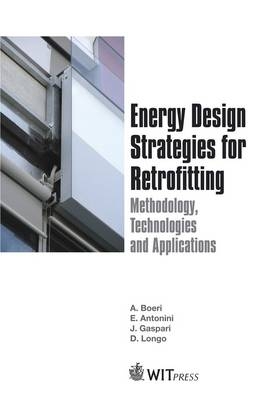
Energy Design Strategies for Retrofitting
WIT Press (Verlag)
978-1-84564-998-2 (ISBN)
Andrea Boeri, architect, Full Professor in Technology for Architecture at University of Bologna, Department of Architecture, where he teaches Construction Design Lab. His fields of expertise are: innovation technologies, energy efficiency and sustainable buildings, smart and resilient cities to face the challenge of the climate issue. He published books and articles about technological and constructive innovative solutions, materials, techniques and detail design, evaluation and strategic renovation of buildings and built environment. Prof Boeri is involved in different international projects, as coordinator of research groups or participant. Ernesto Antonini, architect (IUAV Venice 1984), Ph.D. (Rome "La Sapienza" University 1991), is Associated Professor of Technology for Architecture at Bologna University, Department of Architecture since 2005. From 1993 to 2001, he was the Head of R&D Dept. of Qua.S.Co., Bologna (Italy). From 1996 to 2004, he had been appointed as Professor of Building Technologies at IUAV, Venice (Italy). As researcher and then as senior scientist he participated in several research projects funded by both National and European Programs, mainly focused on innovation in building techniques, materials and components as well as on new tools and equipment for the building process and, lately, on recycling of construction & demolition waste and sustainable architecture. Jacopo Gaspari, architect (IUAV, Venice 2001), Ph.D. (Ferrara, 2006), researcher in Technology for Architecture at University of Bologna, Department of Architecture, where he teaches Materials and Construction Systems. He is currently involved in the following research fields: technologies for energy retrofitting and renovation; sustainable and passive buildings, design strategies for adaptation and transition of the built environment to a low carbon society, as well as mitigation action related to the climate change issue. The findings of his research activity are published in several international articles; he is also author of books on innovative technologies for building construction and on renovation strategies. Danila Longo, architect, Ph.D., researcher in Technology for Architecture at University of Bologna, Department of Architecture, where she teaches Construction Design Lab. Her fields of expertise are technologies for energy efficiency improvement and for quality control and sustainability in new and existing buildings as well as mitigative initiatives related to adaptation of built environment to climate change. Dr Longo is involved in several international research projects. She is author of books and international articles on technological and innovative construction systems. She is delegate for the international relations and researches for the Department of Architecture - UNIBO.
Introduction 1 Energy conscious design approaches for building renewal and urban development [Andrea Boeri] The increasing importance played by the energy factor in the building sector: social and economic implications; The energy issue in EU: towards 2020; EU policies for improving energy efficiency; The weight of the building sector; European market trends and the role of the existing building stock in the urban development; EU Directives on energy efficiency as driving factor; The key role of the housing sector in the existing building stock; The influence of tenure in renovation initiatives; Trends, demands and standards in the housing sector; Housing conditions in EU; The influence of users' profile in the housing sector; Changes in needs; Retrofitting as a tool to improve the quality of the building stock; Energy efficiency as a starting point of retrofitting actions; Renovation levels and expected effect on building quality; Priorities and limits in promoting renovation actions 2 General framework for retrofitting actions on the housing sector in the EU [Danila Longo] Retrofitting experiences in Europe; From the first refurbishment experiences to energy retrofit initiatives; The new generation of sustainable oriented renovation programmes; Recent and current European initiatives in urban renewal; Lesson learned and open issues in retrofitting design; The need for a common tool to exchange information and data; Matching energy retrofitting actions to users' expectations; The management of the complexity; The role played by assessment tools in setting design criteria; Assessing the results of retrofitting actions; The need of an adequate diagnostic framework; Comparing predicted performance level with the real one 3 Retrofitting strategies and performance targets [Jacopo Gaspari] Designing service life of interventions; Age of buildings and level of energy use; Obsolescence phenomena and influence of new requirements on expected performance level; Defining expected lifespan; Defining intervention strategies; Levels of interventions; Retrofitting strategies; A step-by-step design approach; Stratification as a design principal;Between lightness and mass; Volumetric additions; Defining addition models; Effects on energy efficiency 4 Technical and design options [Ernesto Antonini] Higher performance for building envelopes; Envelope features and building thermal behaviour: notes about building physics; Common performance deficiencies in existing building envelopes; Improving thermal performance of the envelope system; Walls; Roofs; External doors and windows; Air tightness; Improving summer energy performance; Screening of glazed surfaces; Ventilated walls and roofs; Innovative material purposes and constraints; Thin films and coatings applied to current building material surfaces; PCM technologies for building envelopes; High performance insulating materials 5 Applications of principals and methodologies for effective retrofitting actions [Jacopo Gaspari] Modelling a case study application; Defining the starting condition level; Step-by-step retrofitting scenarios; Step 01 - Replacement and integration; Step 02 - Building envelope implementation; Step 03 - Building envelope implementation through pre-assembled panels; Step 04 - Facade addition; Energy savings and energy investments; A short overview of LCA approach; Energy investment related to retrofitting actions; Energy investment evaluation; Optimization of retrofitting strategy; Payback time of assumed scenarios; Energy effectiveness index and amortization time
| Erscheint lt. Verlag | 15.12.2014 |
|---|---|
| Verlagsort | Southampton |
| Sprache | englisch |
| Maße | 156 x 234 mm |
| Themenwelt | Naturwissenschaften ► Biologie ► Ökologie / Naturschutz |
| ISBN-10 | 1-84564-998-2 / 1845649982 |
| ISBN-13 | 978-1-84564-998-2 / 9781845649982 |
| Zustand | Neuware |
| Haben Sie eine Frage zum Produkt? |
aus dem Bereich


